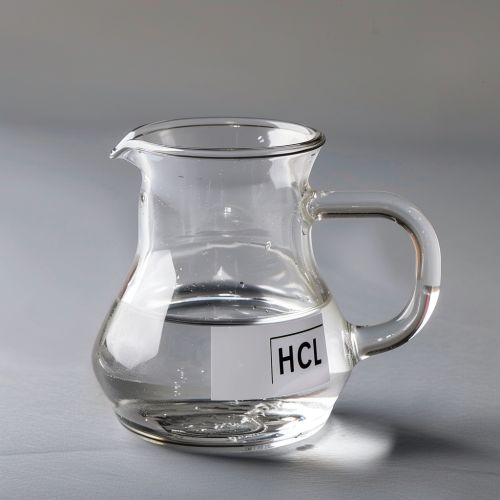Hydrochloric acid: Difference between revisions
(Created page with "== Introduction == <div class='only_on_desktop image-preview'><div class='image-preview-loader'></div></div><div class='only_on_mobile image-preview'><div class='image-preview-loader'></div></div> Hydrochloric acid (HCl) is a strong, corrosive acid that is commonly used in various industrial and laboratory applications. It is a solution of hydrogen chloride in water and is known for its pungent smell and highly acidic nature. Hydrochloric acid is an important chemical...") |
No edit summary |
||
| Line 1: | Line 1: | ||
== Introduction == | == Introduction == | ||
[[Image:Detail-79625.jpg|thumb|center|A clear glass container filled with hydrochloric acid, with a label indicating its chemical formula HCl.]] | |||
Hydrochloric acid (HCl) is a strong, corrosive acid that is commonly used in various industrial and laboratory applications. It is a solution of hydrogen chloride in water and is known for its pungent smell and highly acidic nature. Hydrochloric acid is an important chemical reagent and industrial chemical, with significant roles in the production of chlorides, fertilizers, and dyes, as well as in pH control and neutralization processes. | Hydrochloric acid (HCl) is a strong, corrosive acid that is commonly used in various industrial and laboratory applications. It is a solution of hydrogen chloride in water and is known for its pungent smell and highly acidic nature. Hydrochloric acid is an important chemical reagent and industrial chemical, with significant roles in the production of chlorides, fertilizers, and dyes, as well as in pH control and neutralization processes. | ||
Revision as of 09:05, 19 May 2024
Introduction

Hydrochloric acid (HCl) is a strong, corrosive acid that is commonly used in various industrial and laboratory applications. It is a solution of hydrogen chloride in water and is known for its pungent smell and highly acidic nature. Hydrochloric acid is an important chemical reagent and industrial chemical, with significant roles in the production of chlorides, fertilizers, and dyes, as well as in pH control and neutralization processes.
Chemical Properties
Hydrochloric acid is a monoprotic acid, meaning it can donate one proton (H⁺) per molecule in an aqueous solution. It is classified as a strong acid because it completely dissociates into hydrogen ions (H⁺) and chloride ions (Cl⁻) in water. The dissociation of hydrochloric acid can be represented by the following chemical equation:
\[ \text{HCl} \rightarrow \text{H}^+ + \text{Cl}^- \]
The pH of a hydrochloric acid solution depends on its concentration. For example, a 1 M solution of HCl has a pH of approximately 0, indicating a highly acidic environment. Hydrochloric acid is highly reactive with metals, bases, and organic compounds, making it a versatile reagent in chemical synthesis and industrial processes.
Production
Hydrochloric acid is produced primarily by the direct synthesis of hydrogen and chlorine gases:
\[ \text{H}_2 + \text{Cl}_2 \rightarrow 2\text{HCl} \]
This reaction is exothermic and takes place in specialized equipment designed to handle the high temperatures and corrosive nature of the product. Another common method of producing hydrochloric acid is as a byproduct of the chlorination of organic compounds, such as in the production of vinyl chloride for polyvinyl chloride (PVC) manufacturing.
Industrial Applications
Hydrochloric acid is widely used in various industries due to its strong acidic properties and reactivity. Some of the key applications include:
Metal Processing
In the metal processing industry, hydrochloric acid is used for pickling of steel, a process that removes rust and scale from the surface of the metal. The acid reacts with the oxides on the metal surface, converting them into soluble compounds that can be easily washed away.
Chemical Synthesis
Hydrochloric acid is a crucial reagent in the synthesis of numerous chemicals. It is used in the production of chlorides, such as calcium chloride (CaCl₂) and zinc chloride (ZnCl₂), which have various industrial and commercial uses. Additionally, hydrochloric acid is employed in the production of fertilizers, dyes, and pharmaceuticals.
pH Control and Neutralization
Due to its strong acidic nature, hydrochloric acid is commonly used for pH control and neutralization in various processes. It is used to adjust the pH of water in swimming pools, wastewater treatment plants, and industrial effluent streams.
Biological Role
Hydrochloric acid plays a vital role in the digestive system of humans and other animals. It is secreted by the parietal cells in the stomach lining and contributes to the acidic environment of the stomach. This acidic environment is essential for the activation of pepsinogen to pepsin, an enzyme that breaks down proteins into peptides. Additionally, the low pH of the stomach helps to kill harmful bacteria and pathogens ingested with food.
Safety and Handling
Hydrochloric acid is a highly corrosive substance that can cause severe burns and damage to tissues upon contact. Proper safety measures must be taken when handling hydrochloric acid, including the use of personal protective equipment (PPE) such as gloves, goggles, and lab coats. In case of skin or eye contact, the affected area should be rinsed immediately with plenty of water, and medical attention should be sought.
Environmental Impact
The release of hydrochloric acid into the environment can have detrimental effects on ecosystems. It can lead to the acidification of water bodies, which can harm aquatic life. Industrial facilities that use or produce hydrochloric acid must adhere to strict regulations to prevent accidental releases and ensure proper disposal of waste containing hydrochloric acid.
